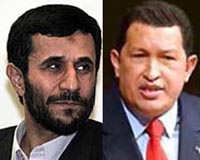| . |  |
. |
Vienna (AFP) Nov 26, 2009 Outgoing IAEA chief Mohamed ElBaradei fired a parting shot at Iran here Thursday, saying efforts to verify the exclusively peaceful nature of its nuclear programme have reached a dead end, as the UN atomic watchdog considered censuring Tehran. Iran's delegate to the meeting threatened to reduce cooperation to a minimum if a censure resolution is passed. ElBaradei has been often accused during his 12 years as head of the International Atomic Energy Agency of being too soft on Iran. But as the end of his term nears -- the Egyptian diplomat steps down next week -- and the IAEA no closer to knowing the true nature and extent of Tehran's nuclear ambitions, he has toughened his language in recent weeks. His tone has become noticeably sharper after the Islamic Republic snubbed his own compromise deal on the supply of fuel for a nuclear research reactor in Tehran. Addressing the IAEA's 35-member board of governors at the start of a two-day meeting, ElBaradei criticised Iran for long concealing a second uranium enrichment plant in Fordo, near the holy city of Qom. Iran's failure to notify the agency of the existence of the plant near Qom until September 2009 "was inconsistent with its obligations", he complained. "Iran's late declaration of the new facility reduces confidence in the absence of other nuclear facilities under construction in Iran which have not been declared to the agency," he said. And he complained that there has been no movement for "well over a year" from Iran on allegations it had previously been engaged in studies on nuclear weaponisation. "It is now well over a year since the agency was last able to engage Iran in discussions about these outstanding issues," he said. "We have effectively reached a dead end, unless Iran engages fully with us." On the uranium deal, which ElBaradei himself masterminded, the diplomat said he was "disappointed that Iran has not so far agreed to the original proposal or the alternative modalities, both of which I believe are balanced and fair." Iran has so far refused an official response to the plan which would see Russia enrich the uranium needed to fuel a nuclear research reactor in Tehran in return for confidence-building gestures. Under the proposed deal, Iran would ship out most of its stockpile of low-enriched uranium for further processing by Russia. But Tehran is reluctant to let go of its uranium without a guarantee of getting enriched uranium back and has proposed a simultaneous exchange of fuel inside Iran instead. Iran's envoy to the IAEA, Ali Asghar Soltanieh, said Iran's counter offer has remained unanswered. He reiterated that Iran wants a second round of talks after the first meeting in October failed to lead to agreement. "Economic and technical considerations and issues, and especially the provision of a guarantee that Iran will receive nuclear fuel must be discussed in a second round of talks," Soltanieh was quoted by Iran state television's website as saying after the agency's meeting. Given the growing frustration over the lack of progress in the long-running standoff with Iran, the five permanent members of the UN Security Council -- Britain, China, France, Russia and the United States -- plus Germany have tabled a resolution to put to the vote by the IAEA board. A number of countries made statements to the board on Thursday afternoon and more were scheduled to speak on Friday, before the resolution would finally be voted on. German ambassador Ruediger Luedeking, introducing the resolution on behalf of the so-called P5+1, said it would "serve as a reminder and an encouragement for Iran to seize the existing opportunities to engage in meaningful negotiations with a view to achieving a comprehensive diplomatic solution. "We extend a hand and appeal to Iran to take it." It would be the first resolution to be passed by the IAEA board since February 2006. Soltanieh has also said Tehran would reduce co-operation with the agency to "the minimum we are legally required" if the board voted in favour of the resolution. "Any gesture or move jeopardising this cooperation ... will be counterproductive," he told reporters at the end of the first day of debate. Iranian TV quoted him as saying: "Western countries must not disturb the positive (cooperation) climate. They should rather allow the technical cooperation of Iran and the agency to follow its positive trend." Share This Article With Planet Earth
Related Links Learn about nuclear weapons doctrine and defense at SpaceWar.com Learn about missile defense at SpaceWar.com All about missiles at SpaceWar.com Learn about the Superpowers of the 21st Century at SpaceWar.com
 Iran seeks deals for a longer Latin hold
Iran seeks deals for a longer Latin holdLa Paz, Bolivia (UPI) Nov 25, 2009 Iran is clinching deals for trade and technical cooperation with Latin American countries with the aim of securing a foothold after the current tour of the region by President Mahmoud Ahmadinejad. Iran has already fostered strong bilateral ties with Nicaragua and Venezuela, but Ahmadinejad's current tour of Brazil, Bolivia and Venezuela is producing a whole series of new contracts that ... read more |
|
| The content herein, unless otherwise known to be public domain, are Copyright 1995-2009 - SpaceDaily. AFP and UPI Wire Stories are copyright Agence France-Presse and United Press International. ESA Portal Reports are copyright European Space Agency. All NASA sourced material is public domain. Additional copyrights may apply in whole or part to other bona fide parties. Advertising does not imply endorsement,agreement or approval of any opinions, statements or information provided by SpaceDaily on any Web page published or hosted by SpaceDaily. Privacy Statement |